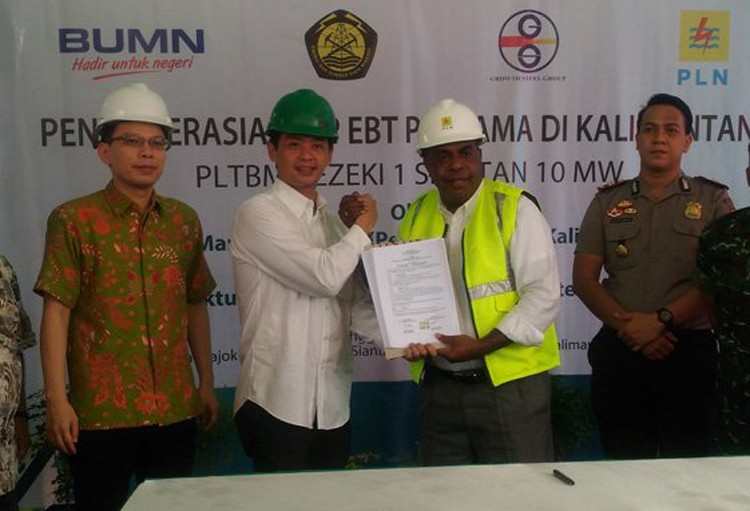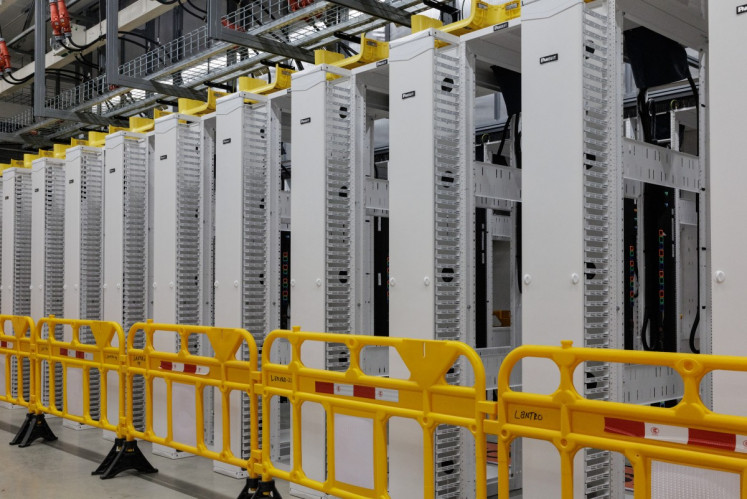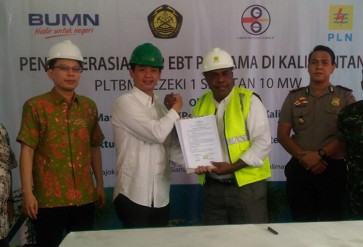Popular Reads
Top Results
Can't find what you're looking for?
View all search resultsPopular Reads
Top Results
Can't find what you're looking for?
View all search resultsPromoting biomass as a source of renewable energy in Indonesia
As part of reaching net-zero by 2060, Indonesia plans by 2025 to produce energy from renewables as much as 23 percent. This renewable energy is contributed by hydro energy (8 percent), geothermal (7.5 percent), biomass (6 percent), and other renewable energy (1.5 percent).
Change text size
Gift Premium Articles
to Anyone
 PLN general manager for the West Kalimantan region Richard Safkaur (third right) and PT Rezeki Perkasa Sejahtera Lestari president director Duken Kuncara exchange a document after signing an agreement on the operation of the biomass power plant (PLTBm) Rezeki I Siantan in Wajok Hulu village, West Kalimantan on April 24, 2022. (tribunpuntianak.com/Nina Soraya)
PLN general manager for the West Kalimantan region Richard Safkaur (third right) and PT Rezeki Perkasa Sejahtera Lestari president director Duken Kuncara exchange a document after signing an agreement on the operation of the biomass power plant (PLTBm) Rezeki I Siantan in Wajok Hulu village, West Kalimantan on April 24, 2022. (tribunpuntianak.com/Nina Soraya)
I
ndonesia has committed to cutting carbon to net-zero by 2060, a huge statement by the government to take extreme action into tackling climate change. The government has detailed its roadmap for net-zero, in which by 2050 the number of fossil fuels used for energy would be no more than 25 percent and most of the energy should be based on renewable energy.
As part of reaching net-zero by 2060, Indonesia plans by 2025 to produce energy from renewables as much as 23 percent. This renewable energy is contributed by hydro energy (8 percent), geothermal (7.5 percent), biomass (6 percent) and other renewable energy (1.5 percent).
The information regarding what energy source is considered renewable should be followed by the same categories that the United Nations has determined. Renewable energy sources consist of solar energy, wind energy, hydropower, ocean energy, bioenergy and geothermal energy.
To reach what is supposed to be called net-zero, each source of energy should be distributed properly considering each country's economic and geographic characteristics. Each country has different advantages and disadvantages to producing renewable energy. Indonesia, which has so many potentials in producing various types of renewable energy, has an advantage in the geographical landscape to smoothly transition our energy source to renewable but we still must keep in mind that Indonesia is still heavily reliant on fossil fuels for energy generation.
From the many sources of renewable energy, the government has created a plan to increase the proportion of biomass in generating electricity. Biomass is considered renewable because its source is from replantable trees, which at the same time absorb carbon.
Indonesia, as one of the biggest producers of wood products, clearly has a huge potential to utilize its energy forestry and wood waste as a source of biomass such as wood chips and wood pellets. From that perspective, Indonesia has an abundant amount of potential to use biomass as one of substitutes for fossil fuels. However, the development and utilization of biomass as an energy source is still very small compared to its potential.
Globally, the biomass market has been on the rise with major developed countries in Asia, such as South Korea and Japan, have significantly increased their usage of biomass as their source of energy generation. South Korea has been the main importer of Indonesian wood pellets with a share of 88 percent followed by Japan with 11 percent. It is expected that in 2023 Japan will increase its import of Indonesian wood pellets through several business commitments made by both countries.


















